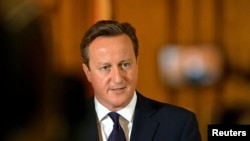Britain's prime minister has defended his country's Security Services after reports that a radicalized British militant, who appeared in videos of the beheadings of Western hostages in Syria, was on a terror watch list before leaving Britain. Security experts continue to debate the best way to fight radicalization in Europe.
Prime Minister David Cameron pledged Friday to use all the resources of the British state to prevent extremists from committing acts of terrorism.
“We will do everything we can, with the police, with the security services, with all that we have at our disposal, to find these people and to put them out of action," said Cameron.
On Thursday it was reported that a man who appeared in Islamic State videos showing the execution of foreign hostages is British citizen Mohammed Emwazi. He had been known to British authorities for five years before he appeared in the videos recorded in Syria.
Now some political leaders in Britain are calling on the government to tighten controls on terror suspects. The Home Office currently uses Terrorism Prevention and Investigation Measures on suspects who cannot be charged or deported; the measures include electronic tagging, reporting regularly to the police, and restricted movement.
Analysts say counter-terrorism measures in Britain and across Europe over the past decade have failed, and now a shift is taking place in which governments are beginning to use stricter policing measures to deal with terrorist threats.
Shaun Gregory is an international security expert at Durham University.
"People are saying we have accommodated, we have reached out to Muslim communities, we have sought harmony and to some extent that has been successful. But Europe is increasingly suffering attacks on individuals, attacks on freedom of speech, and so on. And it’s quite clear that the European context is generating quite literarily thousands of jihadis," said Gregory.
The international policing unit Interpol says as many as 5,000 Europeans have traveled to Syria to join the fight there.
Gregory says over the past decade policies of Interpol member countries towards their Muslim communities have differed widely across Europe. Some countries, like France and Austria, have been less tolerant of Muslim customs. France banned the Burka, Gregory says, as an example of the country’s expectation for Muslim communities to adhere to the secular norms of the country.
In Scandinavian nations, on the other hand, he says the approach has been much more “accommodating”, in an effort to ease tensions with the Muslim community. But with the rise in radicalization and a growing number of terrorist attacks within Europe, he says even these countries are moving away from tolerance, and instead towards more policing and a drive towards integration.
“There has been generally a shift in the center of gravity in Europe towards less tolerance, towards a greater insistence on integration, and that has partly been driven by the rise in the terrorist threat," said Gregory.
Counterterrorism expert Katherine Brown says this shift is not necessarily a positive transition.
She says European countries, by tightening police measures, are ignoring core problems that are exacerbating radicalization on the continent.
"The one thing that does cover European countries as a whole is that counterterrorism programs have been treated in isolation to wider issues of community resilience. They are treated as, this is a security problem, and therefore we are going to look at it in isolation. Rather than recognizing that radicalization and the processes that lead up to it are much more connected with wider issues with society," said Brown.
She says in every European state Muslim communities are generally disadvantaged in relation to other communities. Rising radicalization, she says, is unsurprising under conditions of economic austerity, and governments should focus on improving the economic, social and political position of Muslims within European societies.

